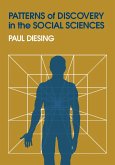This volume offers selected papers exploring issues arising from scientific discovery in the social sciences. It features a range of disciplines including behavioural sciences, computer science, finance, and statistics with an emphasis on philosophy.
The first of the three parts examines methods of social scientific discovery. Chapters investigate the nature of causal analysis, philosophical issues around scale development in behavioural science research, imagination in social scientific practice, and relationships between paradigms of inquiry and scientific fraud. The next part considers the practice of social science discovery. Chapters discuss the lack of genuine scientific discovery in finance where hypotheses concern the cheapness of securities, the logic of scientific discovery in macroeconomics, and the nature of that what discovery with the Solidarity movement as a case study. The final part covers formalising theories in social science. Chapters analyse the abstract model theory of institutions as a way of representing the structure of scientific theories, the semi-automatic generation of cognitive science theories, and computational process models in the social sciences.
The volume offers a unique perspective on scientific discovery in the social sciences. It will engage scholars and students with a multidisciplinary interest in the philosophy of science and social science.
The first of the three parts examines methods of social scientific discovery. Chapters investigate the nature of causal analysis, philosophical issues around scale development in behavioural science research, imagination in social scientific practice, and relationships between paradigms of inquiry and scientific fraud. The next part considers the practice of social science discovery. Chapters discuss the lack of genuine scientific discovery in finance where hypotheses concern the cheapness of securities, the logic of scientific discovery in macroeconomics, and the nature of that what discovery with the Solidarity movement as a case study. The final part covers formalising theories in social science. Chapters analyse the abstract model theory of institutions as a way of representing the structure of scientific theories, the semi-automatic generation of cognitive science theories, and computational process models in the social sciences.
The volume offers a unique perspective on scientific discovery in the social sciences. It will engage scholars and students with a multidisciplinary interest in the philosophy of science and social science.








